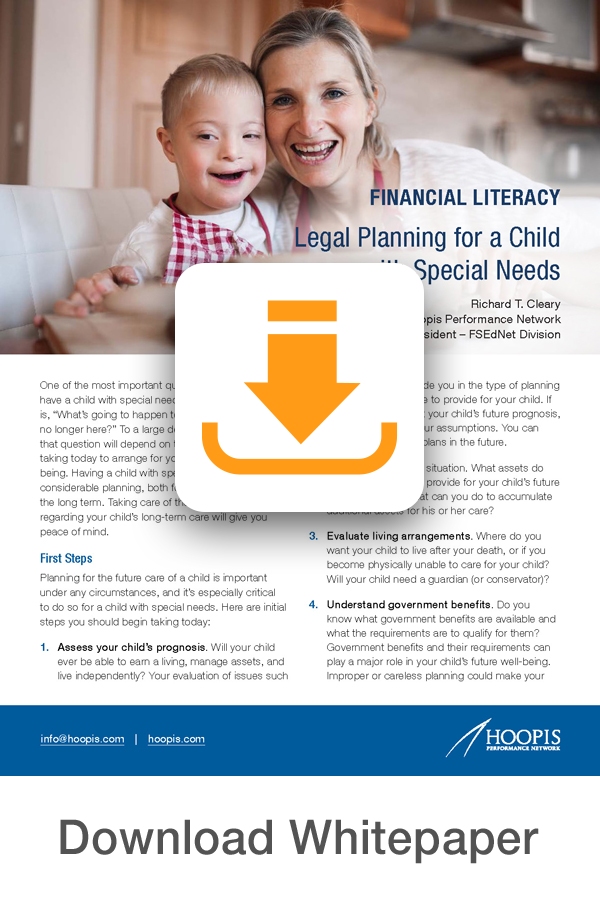Legal Planning for a Child with Special Needs

One of the most important questions parents who have a child with special needs ask themselves is, “What’s going to happen to my child when I’m no longer here?” To a large degree, the answer to that question will depend on the steps you begin taking today to arrange for your child’s future well-being. Having a child with special needs requires considerable planning, both for the short term and the long term. Taking care of the legal formalities regarding your child’s long-term care will give you peace of mind.
First Steps
Planning for the future care of a child is important under any circumstances, and it’s especially critical to do so for a child with special needs.
Here are initial steps you should begin taking today:
- Assess your child’s prognosis. Will your child ever be able to earn a living, manage assets, and live independently? Your evaluation of issues such as these will then guide you in the type of planning you need to complete to provide for your child. If you are unsure about your child’s future prognosis, be conservative in your assumptions. You can always change your plans in the future.
- Review your financial situation. What assets do you have available to provide for your child’s future financial needs? What can you do to accumulate additional assets for his or her care?
- Evaluate living arrangements. Where do you want your child to live after your death, or if you become physically unable to care for your child? Will your child need a guardian (or conservator)?
- Understand government benefits. Do you know what government benefits are available and what the requirements are to qualify for them? Government benefits and their requirements can play a major role in your child’s future well-being. Improper or careless planning could make your child ineligible for certain benefits. Government benefits fall into two groups:
- Entitlement programs. Eligibility for entitlement programs is based on meeting certain requirements, such as age, disability, or blindness. An individual who, for example, meets the required definition of “disability” is entitled to receive benefits, regardless of that individual’s financial situation.
- Needs-based programs. To receive benefits from a needs-based program, a disabled individual cannot have income or assets above stated amounts.
Legal Planning Overview
Once your initial assessment is complete, the care and well-being of a child who is either a minor or an adult who is mentally, physically, and/or developmentally disabled can be greatly enhanced by your efforts to complete legal, medical, financial, and educational planning. This white paper focuses on the area of legal planning. Please see our other white paper for tips on medical, financial, and educational planning for a child with special needs.
In general, legal planning will establish how your estate will be distributed when you die. Who will care for your child with special needs when you’re no longer able to do so? How can your estate be arranged to provide for your child without disqualifying him or her from receiving government benefits? The 6 legal issues listed below are important in planning the future for a child with special needs.
- Will. The primary purpose of a will is to state how you want your assets distributed at your death.
- Guardian. If your child’s condition warrants it, give careful thought to naming a future guardian or conservator for your child, after both parents are gone. The child’s guardian may be different from the trustee of financial assets.
- Letter of intent. A letter of intent serves as a blueprint of what you want your child’s life to be like if there comes a time when you can no longer care for him or her.
- Special needs trust. This type of trust that can receive and manage assets for the benefit of your disabled child, without disqualifying him or her from receiving government benefits. Be careful here—boilerplate wording from an attorney who is not experienced in this field will not suffice. Special needs trusts should be specific and include exact wording, to prevent your child from being disqualified from receiving government support.
As your child reaches adulthood, you might lose the authority to make decisions for him or her. The two documents described below enable you to continue assisting your adult child in making appropriate decisions throughout his or her lifetime.
Both documents refer specifically to the Health Insurance Portability and Accountability Act of 1996 (HIPAA). This allows disclosure of medical and hospital records and information to the “agent” that is not subject to federal regulation of privacy rules. Don’t forget to identify “alternate agents” to carry on for you after you are no longer able to do so.
- Power of attorney. This legal instrument is used to delegate legal authority to another person, giving that person the authority to make property, financial and other legal decisions during the lifetime of the person who executes the power of attorney (the initiator). A power of attorney remains in effect only while the initiator is alive. Upon the initiator’s death, it is automatically canceled and of no effect.
- Medical directives. In addition to recording the treatments an individual wishes to have or not have, should he or she become unable to make those decisions, a medical directive also appoints a proxy—someone to make medical decisions for a person who cannot make medical decisions on his or her own.
Now let’s examine each of these 6 important legal areas in more detail.
Your Will
A will is the legal document that states the actions you want taken after your death, with regard to the disposition of your property, the guardianship of any minor or disabled children, and the administration of your estate.
If you die without a will, you are said to die “intestate,” and the state in which you reside will make these important decisions through its intestacy law. This means that the state will determine who receives your property, who becomes the guardian of your minor and/or disabled children, and how your estate will be administered. By preparing your will, you can avoid negative potential implications such as the following:
- The court-appointed guardian might not be someone your child even knows.
- Any inheritance received by your child in excess of $2,000 could disqualify him or her from receiving needs-based government benefits.
A will is an important first step in your legal planning… it sets everything else in motion.
Guardians
In most states, once a child reaches age 18, he or she is presumed to have decision-making capacity, and the parents’ legal authority ends. Parents of children with special needs have various options, each with advantages and disadvantages depending on the situation, to establish a new legal authority to continue making important decisions for the child.
If the child is incapable of making personal or financial decisions once he or she reaches the age of majority, a parent—or anyone else who is an adult, is not incapacitated, and does not have a significant conflict of interest—can petition the court to be appointed the adult child’s guardian or conservator (the terminology is different in different states).
It’s important to give careful thought to who will have responsibility for your child with special needs after both parents are gone. A guardian or conservator is the individual who will care for your child and manage his or her affairs when you’re no longer available or able to do so. The laws regarding this person’s roles vary from one state to another.
Among the various guardianship/conservatorship arrangements, there are 2 basic types, and you will need to select one of them. Your choice will largely depend on your evaluation of your child’s developmental disabilities:
Limited guardianship or conservatorship. The powers of the guardian or conservator are limited to reflect the needs of the disabled individual. A limited guardian or conservator is appropriate if your specialneeds child is capable of performing some, but not all, the tasks of daily living and/or managing his or her financial resources.
General guardianship or conservatorship. The guardian or conservator has full decision-making powers for a disabled individual with respect to finances, living arrangements, medical care, etc.
Letter of Intent
A letter of intent is a blueprint of your child’s situation and your wishes for your child when you are no longer there to carry them out. Although it is not legally binding, the letter provides direction for the person or persons who will be caring for your child.
Write a letter of intent as soon as possible and update it as your child grows. Include the following types of information:
- The child’s vital information (full name, nickname, place and date of birth, Social Security number), plus the name and contact information of anyone involved in your child’s life, such as a caseworker, school or work contact, financial advisor, executor of your will, and/or the child’s guardian.
- Medical information about your child, including diagnosis, care, and support he or she currently receives, medications, emergency instructions, physicians, therapies, etc. It’s a good idea to either include a set of the child’s medical records or to state where those records are located.
- A “snapshot” of your child’s capabilities with regard to activities of daily living (eating, bathing, getting dressed, toileting, transferring, and continence).
- Any special equipment your child needs, such as wheelchairs, shower chairs, modified computers, voice-recognition software, utensils or plates, etc. Also include whom to contact to maintain this equipment or where to go to repair or replace it.
- Education your child has received, as well as future education you’d like him or her to receive.
- Living arrangements…where would you (and your child) like for the child to live if something should happen to you? What happens if you become physically unable to care for him or her anymore? Indicate whether you feel your child can live independently or would be better in a group environment. This decision might need a long lead time (years, even) to put into place for independent living, depending on where you live.
- Employment opportunities that you feel might be open to your child when he or she becomes an adult.
- Social/behavioral information, such as activities and the types of toys your child enjoys, who your child likes to play with, plus any behavior-management issues, including how you discipline your child.
- Dietary information, including food likes and dislikes, diet restrictions or allergies, problems swallowing, etc.
- Religious information, as appropriate.
- Financial guidance, including information about medical insurance, financial resources available to the child, and whom to contact for assistance and additional information.
Special Needs Trust
The purpose of a special needs trust is to provide financial assets for your child’s future care and well-being, while maintaining his or her eligibility for government benefits, such as Social Security, Supplemental Security Income, Medicare, or Medicaid.
Under current federal law, an individual with more than $2,000 in assets will be disqualified from most needs-based government benefits. State assistance programs might also be based on need. The only exception to this law is an ABLE account, also known as a 529 ABLE or 529A account. It is a state-run savings program for eligible people with disabilities in the United States. Rules governing ABLE accounts are codified in Internal Revenue Code section 529A, which was enacted by the Achieving a Better Life Experience Act in 2014.
If your child were to receive an inheritance from you directly, it’s highly probable that the inheritance would disqualify him or her from receiving needed benefits. Do not leave assets directly to your child.
With a special needs trust, you leave assets to the trust. The trust is managed by a trustee, who can use trust assets on your child’s behalf. Special needs trust requirements are stringent, so it’s important that you consult with an experienced attorney to set one up.
In a properly structured special needs trust, the trust holds title to the property for the benefit of the disabled child or adult. The assets in the special needs trust can be used to provide for the needs of the disabled individual and to supplement benefits received from government assistance programs. For example, trust assets could be used to provide your child with the following:
- Transportation, including the purchase of a vehicle
- Training, rehabilitation, or education programs
- Equipment
- Payment of medical, dental, and eyesight needs
- Payment of insurance premiums
- Companion/home health aides
- Entertainment
- Items to enhance quality of life/self-esteem
A special needs trust can hold cash, as well as title to stocks, bonds, mutual funds, real estate, and personal property. In addition, it can own and/or be the beneficiary of life insurance policies. Another use for a special needs trust is to receive any proceeds from personal-injury settlements without jeopardizing the disabled individual’s eligibility for government benefits.
Special needs trusts are designed to supplement, not replace, the kind of basic support provided by government programs like Medicaid and Supplemental Security Income (SSI). Special needs trusts pay for comforts and luxuries – “special needs”—that could not be paid for by public-assistance funds.
This means that if money from the trust is used for food or shelter costs on a regular basis or distributed directly to your disabled child, those payments will count as income to him or her. This can affect eligibility for government benefits. One of the trustee’s most important jobs is to use discretion in making distributions from the trust, so as not to jeopardize the beneficiary’s eligibility for these government benefits.
If the beneficiary receives SSI, here are some basic expenses that should not be paid through a special needs trust without consultation with a special-needs attorney:
- Cash given directly to the beneficiary for any purpose
- Food or groceries
- Restaurant meals (except if given as an occasional gift)
- Rent or mortgage payments
- Property taxes
- Homeowners or condo association dues
- Homeowners insurance if the insurance is a mortgage requirement
- Utilities such as electricity, gas, and water
- Utilities hookup or connection charges
However, many of these payments will only cause a 1/3 reduction in SSI benefits. The trustee may determine that the benefit of the trust making these payments far outweighs the loss of income.
Still, to ensure that your child can retain eligibility for government benefits, it’s important that wellintentioned family members, such as grandparents, understand that their wills should bequeath assets to the special needs trust, not directly to the disabled individual.
Power of Attorney
A power of attorney (POA) is a legal document giving one person the power to act for another person.
Conventional POAs lapse when the creator becomes incapacitated, but a “durable POA” remains in force to enable the agent to manage the creator’s affairs, and a “springing POA” comes into effect only if and when the creator of the POA becomes incapacitated. A medical or healthcare POA enables an agent to make medical decisions on behalf of an incapacitated person.
A person who is appointed as power of attorney is not necessarily an attorney. The person could just be a trusted family member, friend, or acquaintance.
Medical Directives
Medical directives, also known as advance directives, guide choices for doctors and caregivers if a person is terminally ill, seriously injured, in a coma, in the late stages of dementia, or near the end of life.
Advance directives need to be in writing. Each state has different forms and requirements for creating legal documents. Depending on where you live, a form may need to be signed by a witness or notarized. You can ask a lawyer to help you with the process, but it is generally not necessary.
You can change your directives at any time. If you want to make changes, you must create a new form, distribute new copies, and destroy all old copies. Specific requirements for changing directives can vary by state.
It’s easy to feel overwhelmed when doing the legal planning needed to ensure that your disabled child will get the best care possible. But advance legal planning is critical to ensuring that all potential scenarios are covered. Being proactive in this area can prevent costly, stressful, and time-consuming problems from occurring down the road.



